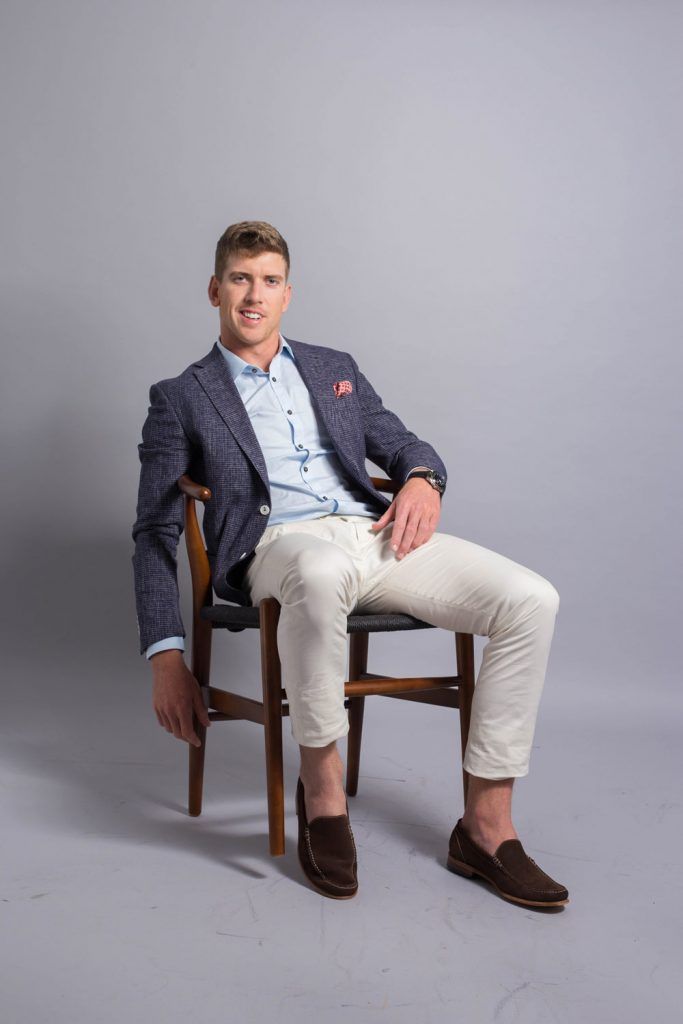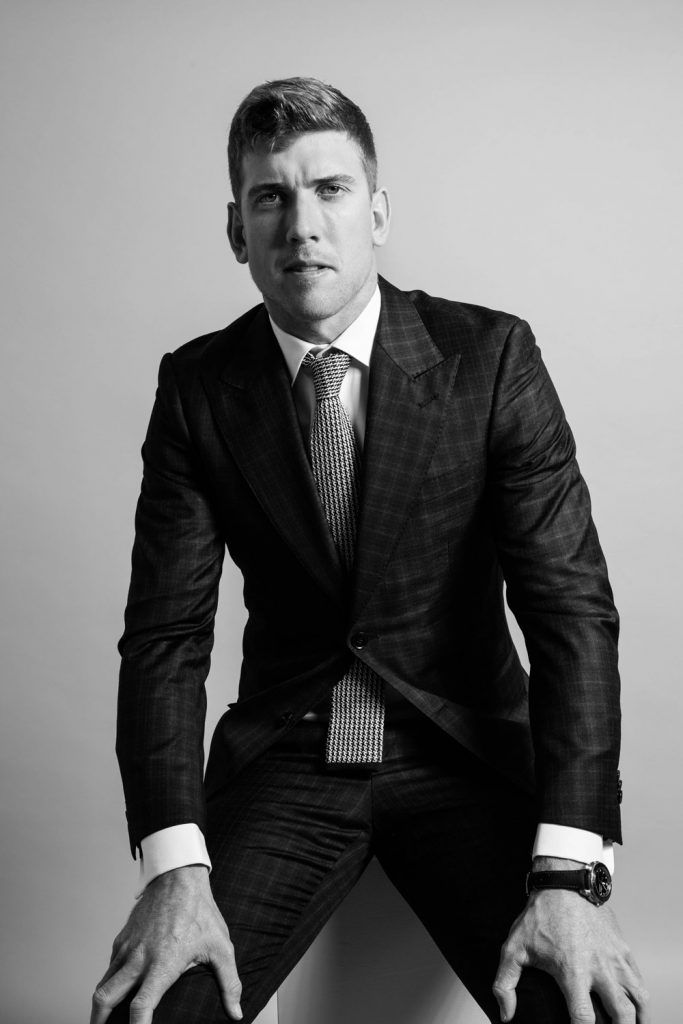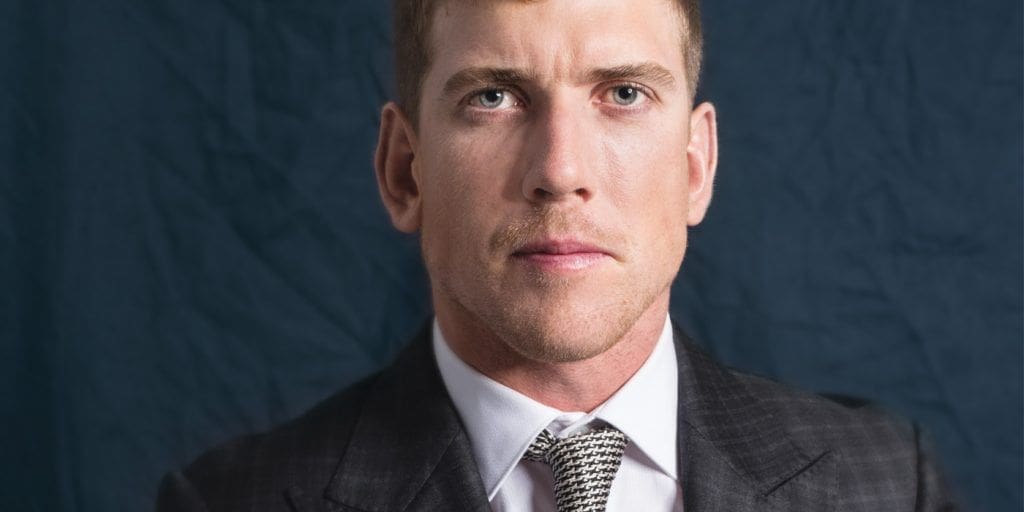Peter Burling – Triumph On And Off The Water
Bermuda. June, 2017. The time is 1.31pm exactly. The pale sky is patterned with light grey clouds and seagulls squalling above. You look down at your Omega watch for what feels like the millionth time. There’s a light air about the ocean… an estimated nine-knot wind with the boat ebbing underneath you. You’re standing at the helm of New Zealand’s beastly 15-foot glassfibre catamaran. Cruise ships dot the skyline like high-rises. Smaller boats dot the waters, but you barely notice them as the expectation of a nation is weighing heavily on your shoulders.
Peter Burling, the young sailor, was lined up against the formidable Oracle Team USA in that first race in Bermuda. It’s difficult to imagine what was going through his mind. Then, 21 minutes later, he had set the tone for how the 35th America’s Cup would roll out.
After Team New Zealand’s amazing overall win against Oracle Team USA (captained by Australian-born Jimmy Spithill), with average speeds of 23.64 knots and 7 to 1 legs won, we can imagine the feeling of achievement the team must’ve felt when beating the opposition by mere seconds.
New Zealand first hosted the America’s Cup in Auckland in 2000, after their heroic win in 1995, and then again in 2003. The influence it had on the income of New Zealand was astounding. The 2003 Louis Vuitton Cup was worth NZD$529 million. In a 2014 independent evaluation, then Economic Development Minister, Steven Joyce said that: “The economic benefit from our investment in Team New Zealand is considerable. From a $36 million taxpayer investment, the evaluation shows an estimated positive impact of $87 million to the New Zealand economy.” With the abundance of media attention at Auckland’s waterfront, New Zealand boomed from the excitement of the world-class event. I remember the 2003 America’s Cup, with the buzz and splendour of up to 50 superyachts in our waters.
When asked about being named 2017 M2 Man of the Year, Peter Burling is cool as always. It’s pretty obvious the man’s got some pretty humble roots. “It’s not about the awards,” he says. “It’s more about just competing and having fun. And just doing the best you can and always trying to improve.”

Born in Tauranga in 1991 to Richard and Heather, Burling attended school in Welcome Bay, and loved growing up around water. “Actually, my dad got my brother into it to start with,” the Olympic gold medalist laughs. “And then I was kind of dragged along. Eventually I just got into it.”
Burling started sailing aged six. From there, he won his first national title at age 12, his first world title when he was 15 and became the youngest New Zealand sailor to compete in the Olympic games at Beijing in 2008, aged just 17. Burling only went to school a handful of weeks that year, yet amazingly still passed his final exams and gained university entrance. After school, he tackled the University of Auckland – adding another impressive achievement to his already glowing resume. Half-way through his degree, though, he pulled out – not because he wasn’t up to it but because he wanted to focus all his energy full-time on his dream of sailing boats with his good mate Blair Tuke.
It seems you can’t talk about one of these boys without mentioning the other, a real ‘bromance’. “I’ve got a really good team around me,” he says. Burling and Tuke were the first sailors to win four consecutive 49er-class World Championships in 2013, 2014, 2015 and 2016. They won all 28 of the major regattas in the 49ers between the 2012 London Olympics and the 2016 Rio Olympics. They have just squared off in the nine-month Volvo Ocean race around the world, starting in Alicante, Spain and ending in The Hague, Netherlands. One would think that the ability to turn on and off the competitive streak would be quite difficult to maintain, but: “we’ve competed against each other in the past. It’s not the first time. We really enjoy that,” he says.

In 2013, the decision to revamp the Team New Zealand crew was made after the team’s unfortunate loss by one race (making it 9 wins to 8 to Oracle Team USA) in San Francisco. Despite the scrutiny over the defeat, the team remained stoic and Burling entered the 2017 regatta with a lot of pressure on his shoulders. The title of the head name of Emirates Team New Zealand went to him, the ‘future’ of sailing.
Taking on this role as the helmsman placed a lot of pressure on Burling. He had to step up. What with the whole of New Zealand breathing down his neck… And having to race against a team funded by one of the world’s richest men, Larry Ellison – the American businessman and chief technology officer of Oracle.
The Kiwi team was prepared to go harder, faster and longer to win the 2017 America’s Cup.
This was a real ‘road to redemption’ story for Team New Zealand. “You have to be able to perform when the pressure’s put on,” he says. Burling shows that the weight of this expectation is just another day at the office for him. His stoic approach to such a prominent position in sport allowed him to further better himself from his downfalls, to take it on the chin and to learn from the lessons he was taught through his many sporting experiences. “When I see a tough situation [the challenge] is figuring out whether you can overcome it.”
 A perfect example of his drive is his interest in the technology, as well as the sailing itself, making sure that all aspects of the sailing goes smoothly. “In the design team,” he says, “you’ve also got the experts in every field. But it kind of feels like the more the sailors understand about the boat, the more they can feed back, and actually make things work how they want them to. And it’s a massive part of winning the America’s Cup, and… it is definitely a design and development race.” His willingness to better the team in every aspect of sailing is true testament to his drive and ambition to succeed.
A perfect example of his drive is his interest in the technology, as well as the sailing itself, making sure that all aspects of the sailing goes smoothly. “In the design team,” he says, “you’ve also got the experts in every field. But it kind of feels like the more the sailors understand about the boat, the more they can feed back, and actually make things work how they want them to. And it’s a massive part of winning the America’s Cup, and… it is definitely a design and development race.” His willingness to better the team in every aspect of sailing is true testament to his drive and ambition to succeed.
That final race, during the 2017 America’s Cup, and New Zealand’s success was a bit closer than they expected it to be. With their first four wins under their belt, Team New Zealand was very, very chuffed and proud of their result. “We always had the belief that we could go there and win it. Everyone in the team had the goal, and that was what they were working for. To go, to win the America’s Cup, and to be able to do that part of it well… Everything really did come together at the right time.”
When asked about his greatest achievements in his career, Burling is humble as always. You’d think it goes without saying that the America’s Cup win is on the top of the list. But he doesn’t mention it. He doesn’t mention any specific win or loss. He just seems to brush it off almost, as though his achievements – though they mean the world to him and New Zealand – don’t define him as a man. His definition is his passion: “I’ve been pretty fortunate in sport so far. It’s been an amazing ride to here, and we’re just looking forward to keeping on – trying to improve the skills, taking on new challenges and just pushing ahead.”
Even after his big America’s Cup win, the man knows who has supported him through thick and thin. His family, his friends, his “core group of mates,” he says, have helped him grow in this sport he thrives at. “Since I have been back, there’s been a lot of stuff around the Cup, around the parades and bits and pieces – which just absolutely blew us away, the amount of support we do have back here. We kinda knew what was back here. But to actually come back and see it was pretty incredible.”
Adapting to changing environments and moving forward with sailing (and other opportunities given to him since the win) Burling gives thanks to his team, family and New Zealand. It must have been overwhelming for the guy, but he took it on the chin, showing a commendable mindset and drive to achieve the best of his (and Team New Zealand’s) ability. It’s in times like these that most men would crumble under the pressure. The M2 Man of the Year didn’t though. He achieved what many would find daunting, especially in the wake of race four of the America’s Cup, where New Zealand raced against Britain.
During this race, the boat capsized at the starting block. One can only imagine what was going through his mind at that point.
“We were just trying to do everything we could to get the boat around the track,” he recalls. “It was a bit of a roller coaster. Not many people know, but we busted a wing as we were sailing out. So we went back in to put the spare wing on the boat. That first race win was pretty incredible that day. And then we probably pushed a little bit harder in that second one. But it was something that was just ‘one of those things’… We got on with it. You look back at all the footage, and it looks pretty dramatic. I think we were just incredibly lucky no one got hurt. There’s a lot of bits and pieces flying around. And to be able to get the boat back on its feet with no one hurt, no major structural damage – was incredibly fortunate. It could’ve been a lot worse.”
But what motivation carries Burling through those harsh races? And how does that better his sailing? In any daunting situation, the man claims, his motivation stems from the passion of the sport. The best thing, he says, that he’s learnt from sailing is the abundance of skills he has gained along the way.
When asked by M2 about any advice he would give to young, budding sportsman, he replies with humble wisdom. He says that he finds it “hard to pick one piece of advice. I think everyone has advice that’s useful, and it’s all about creating your own way. Everyone’s different. [So] just find what works for you, and how you can get the best out of yourself.”

